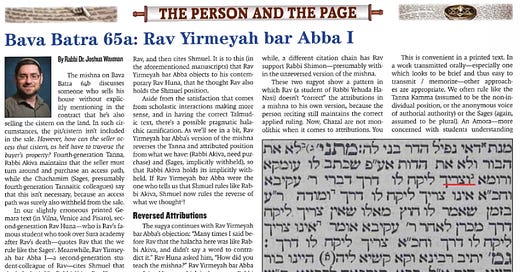My article this past Shabbat was about Rav Yirmeyah bar Abba I. You can read it in full here (NJ Jewish Link webpage, flipdocs, paid Substack).
Here is the quick outline version.
Discuss the sugya, about selling a house — does it include the cistern, with Rabbi Akiva and the Sages taking contrary positions in the Mishnah.
According to our printed text, Rav Huna quotes Rav that we rule like the Sages; And Rav Yirmeyah bar Abba quotes Shmuel that we rule like Rabbi Akiva. But, this is highly irregular, as Rav Yirmeyah bar Abba is the talmid-chaver of Rav, not of Shmuel! We fix the text. He had appeared slightly later, so a scribe repeated it.
Instead, there is no explicit citer of Shmuel. I take this as Rav Huna citing both Rav and Shmuel, as I do in many other cases.
This has potential repercussions; if we rule like Shmuel, a careful study of the sugya shows that Rav Yirmeyah bar Abba reverses Rabbi Akiva and the Sages’ positions in the Mishnah, so Shmuel might hold the reverse.
Indeed, we see that Rav Yirmeyah bar Abba disbelieves that Rav said what Rav Huna said, for Rav didn’t object when he (RYbA) had said the opposite regarding with whom to rule. The answer, as Rav Huna points out, is that Rav Yirmeyah bar Abba reverses Rabbi Akiva and the Sages’ positions in the Mishnah, so ultimately, there’s no difference in terms of practical halacha from the way Rav thought it should come out.
Talmudic Sages aren’t monolithic, and have different attitudes towards the integrity of attributions. There are also many reasons attributions are important, and one is that it helps identify how we rule, especially in an oral transmission environment where this is an extra piece of knowledge to keep track of. But if it is Rav and Shmuel, and we generally rule like Shmuel in monetary matters, that becomes immediately available with no extra effort.
Contrast to our gemara, where the square letter Ashuri footnote, which tells us where the later halachic authorities rule, effectively tells us how we rule. E.g. in the image below, the ג appears within the words of (purported) Rabbi Akiva.Otherwise, we need to remember it.
We might imagine a Sage deliberately and falsely reversing attributions, so as to create an oral “text” that includes the disputants and automatically the way we rule. This doesn’t seem to be the case with Rav. He is merely silent as someone else reversed positions (we don’t know if deliberately or through transmission error), where they have a separate statement how we rule.I point to another instance where Rav does the same thing, in Rosh Hashanah 22a.






